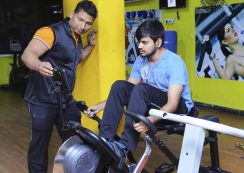
DIET & TRAINING
Fuel
If you’re exercising, you’re going to be using up more calories than usual. While some people welcome a little weight loss, you’ll have to fuel up eventually or you’ll waste away. Your body can use fat, protein, or carbohydrate to gain energy. It depends on the type of exercise you do, but generally starchy foods are a good way to get slow-release energy, and if you just need an occasional quick boost then sweet or sugary food can help.В “A high-carbohydrate snack 30-60 minutes before exercise, such as a jam sandwich, banana or sports drink, is generally found to be beneficial,” says Dr Sam Stear, author of Fuelling Fitness for Sports Performance. “David Beckham keeps jelly babies in his pocket and Madonna likes to fuel her dance routines with a slice of toast and strawberry jam.”
Protein
Protein is needed to build and repair muscles and for hundreds of other structures, enzymes and so on around the body. It’s healthiest in lean forms (such as skinless chicken or many vegetarian foods), or as fish (white or oily). Increasing your exercise levels slightly will not increase your need for protein; it’s only needed when you’re training very hard – say an hour each day at high intensity. Long distance runners or weight lifters may need double the usual amount.
Vitamins, minerals, and more
Even if you’re eating more starchy food, don’t forget to include lots of fruit and veg in your diet. It’s the best way to get your vitamins and minerals, all in the forms that the body can absorb most efficiently. If you do want to take commercial preparations, a good multivitamin and mineral supplement will be enough for most people. Many sport supplements are a waste of money, and most professional sportspeople don’t need them, no matter how much exercise they do. If you’re not eating regular meals or are dieting, you may well need extra nutrients.
Water!
Getting all hot and sweaty makes your lose water and salts, so take a water bottle into the gym and sip away at it. During moderate exercise, an average person loses 500ml of water every 30 minutes. “You need to drink about 1.2 litres of fluid for every kilogram of body weight lost during exercise, so remember to weigh yourself before and after you exercise,” say Dr Sam Stear. Remember that you need more in hot weather too. Drinks containing caffeine or lots of sugar can have a dehydrating effect on the body, so avoid them when you’re exercising. Stick to water, diluted fruit juice, or isotonic sports drinks.
Strength Training
Fueling up is key to any Strength Training Diet
Aim to go into your workout well nourished and well hydrated so that there is enough energy available in the bloodstream and muscles for an effective workout. Plan a pre-workout snack or meal. Fuel your body with foods that are high in carbohydrates and contain a lean source of protein for sustained energy. Some tried and trued protein and carbohydrate combinations include:
homemade smoothies made with milk, soy milk or yogurt and fruit or fruit juice
low fat cheese and crackers
carbohydrate based energy bars and granola bars
yogurt and fruit
В½ whole grain bagel or bread with nut butter
Make fluids a priority throughout the day by drinking a cup of water with each meal and snack. To ensure your body is hydrated two to three hours before training, drink two to three cups of water at this time. Follow that by drinking an additional cup of water 10 to 20 minutes prior to your workout.
Give your muscles solid recovery fuel
Post-workout nutrition is an equally important part of any successful strength training diet. As with pre-workout nutrition, timing is just as important after a workout when it comes to recovering your muscle energy. Studies show that eating carbohydrates and protein within 30 minutes of completing a strength training workout is an effective way to restore amino acids and carbohydrate in the muscles. Get energy back to the muscles within 30 minutes and again within two hours to help rebuild muscle energy. Remember your fluids for recovery. Drink at least two cups of water after your workout to help replace the water you have lost in sweat.
Building Muscle: Protein vs. Carbohydrates
In keeping with conventional wisdom regarding nutrition, athletes traditionally devour plates of protein-rich foods. The theory was that if athletes ate a lot of protein, they would build a lot of muscle. There is a problem with this tradition, however. Extra protein does not build muscle bulk. On the other hand, a challenging strength training program, coupled with an increase in total daily caloric intake, will build muscle.
Carbohydrates are fundamental for strength training because unlike protein, carbohydrates are readily stored in your muscles for fuel during exercise. Adequate protein is important for building and protecting your muscles, but excessive amounts do not enhance gains in muscle or muscle strength. If you strength train on a regular basis, you should digest 0.5 to 0.7 grams of protein per pound of body weight per day (1.2 to 1.7 g/kg). You can do this by simply eating balanced meals and snacks that contain a source of protein such as meat, poultry, fish, dairy products and fortified soy products, eggs, nuts, tofu and dried beans.
Bottom Line: Remember to feed and water your body regularly to get the results you want. A solid strength training diet is just as important as a training plan when it comes to building strength to power up!
Strength training and a vegetarian diet
If you don’t eat meat, it can take a bit more planning to get adequate protein for muscle building and sports training. Vegetarians must take extra care to avoid deficiencies of iron, zinc, and B12, which can hurt exercise and strength training performance.
The following tips will help vegetarians who want to get the most from strength training programs.
How to Get Adequate Protein in Your Diet
The current protein recommendations for optimal muscle building in a strength athlete is 1.6 to 1.7 gram protein per kilogram of body weight (0.73 grams per pound). For a 200-pound athlete, that is a total of 145 to 154 grams of protein a day. There is no scientific evidence that more than 2.0 grams of protein per kg of body weight has any additional benefit in muscle strength or size.
You can get enough protein by including plenty of low-fat dairy products and protein-rich plant sources, like soy, in your diet. The following protein sources may work for vegetarians:
Milk, 8 oz, 8 grams
Tofu, 3 oz, 15 grams
Yogurt, 8 oz, 8 grams
Cheese, 3 oz, 21 grams
Peanut butter, 2 tbsp, 8 grams
How to Get Adequate Iron in Your Diet
Heme iron is a type of easily absorbed iron that is found in animal protein. If you eat fish or chicken, you will get this type of iron, but if you eat no meat, you will need to find other sources of iron. Our bodies don’t absorb non-heme iron –- the kind found in vegetables -– as easily as the iron that comes from animal foods. Non-meat eaters, especially female athletes, must pay attention to their dietary iron needs. Good sources of non-heme include wholegrain cereals, leafy green vegetables, figs, lentils and kidney beans, and some dried fruits.
How to Get Adequate Vitamin C in Your Diet
Vitamin C in fruits, vegetables, and other foods help vegetarians absorb non-heme iron from other foods, so it’s a good idea to eat a combination of foods at each meal. Consider eating citrus fruits with an iron-fortified wholegrain cereal or have a citrus fruit juice with beans.
How to Get Adequate B12
Because vitamin B12 is available only from animal products, it is one of the most common nutrients missing from the diets of vegetarian athletes. To get enough B12 (you require only a small amount-2.4 micrograms-per day) try to eat B12-fortified foods like soymilk, and cereal. You can also get enough B12 if you consume eggs, cheese, milk or yogurt.
Avoid Foods That Interfere with Iron Absorption
Some foods contain substances that block the absorption of iron in the intestine. Coffee, whole grains, bran, legumes, and spinach all interfere with iron absorption and should be combined with vitamin C to increase iron absorption.
Talk To Your Doctor About Supplements
Although dietary supplements should not be used to make up for a poor diet, there are times when they can help prevent some deficiencies. Ideally, you should discuss the use of any supplements with your healthcare team.
All athletes are encouraged to eat a balanced diet that includes a wide variety of foods, but vegetarian athletes can rest assured that they don’t have to eat meat in order to get adequate nutrition for strength building. If you have concerns about your nutritional status, is is recommended that you talk with your doctor or a registered sports nutritionist to review you eating plan and make recommendations.

